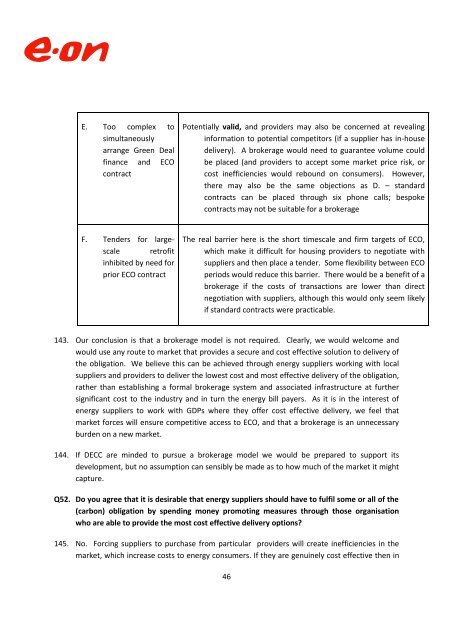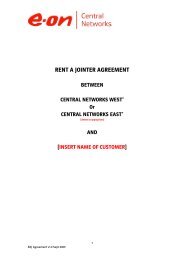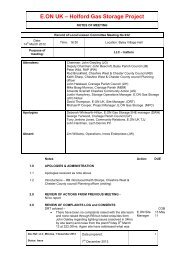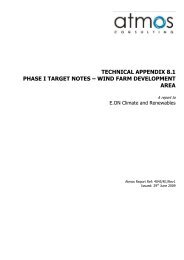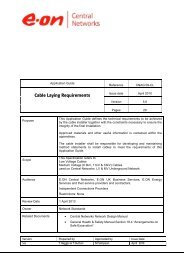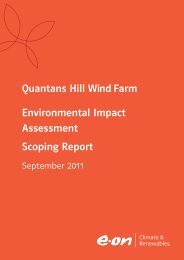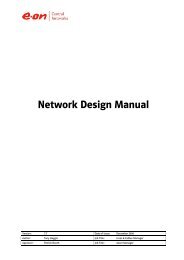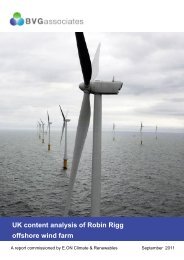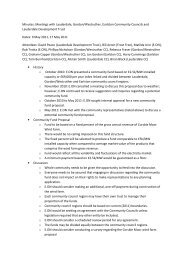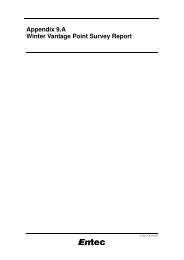1 Department of Energy and Climate Change The Green Deal and ...
1 Department of Energy and Climate Change The Green Deal and ...
1 Department of Energy and Climate Change The Green Deal and ...
You also want an ePaper? Increase the reach of your titles
YUMPU automatically turns print PDFs into web optimized ePapers that Google loves.
E. Too complex to<br />
simultaneously<br />
arrange <strong>Green</strong> <strong>Deal</strong><br />
finance <strong>and</strong> ECO<br />
contract<br />
F. Tenders for largescale<br />
retr<strong>of</strong>it<br />
inhibited by need for<br />
prior ECO contract<br />
Potentially valid, <strong>and</strong> providers may also be concerned at revealing<br />
information to potential competitors (if a supplier has in-house<br />
delivery). A brokerage would need to guarantee volume could<br />
be placed (<strong>and</strong> providers to accept some market price risk, or<br />
cost inefficiencies would rebound on consumers). However,<br />
there may also be the same objections as D. – st<strong>and</strong>ard<br />
contracts can be placed through six phone calls; bespoke<br />
contracts may not be suitable for a brokerage<br />
<strong>The</strong> real barrier here is the short timescale <strong>and</strong> firm targets <strong>of</strong> ECO,<br />
which make it difficult for housing providers to negotiate with<br />
suppliers <strong>and</strong> then place a tender. Some flexibility between ECO<br />
periods would reduce this barrier. <strong>The</strong>re would be a benefit <strong>of</strong> a<br />
brokerage if the costs <strong>of</strong> transactions are lower than direct<br />
negotiation with suppliers, although this would only seem likely<br />
if st<strong>and</strong>ard contracts were practicable.<br />
143. Our conclusion is that a brokerage model is not required. Clearly, we would welcome <strong>and</strong><br />
would use any route to market that provides a secure <strong>and</strong> cost effective solution to delivery <strong>of</strong><br />
the obligation. We believe this can be achieved through energy suppliers working with local<br />
suppliers <strong>and</strong> providers to deliver the lowest cost <strong>and</strong> most effective delivery <strong>of</strong> the obligation,<br />
rather than establishing a formal brokerage system <strong>and</strong> associated infrastructure at further<br />
significant cost to the industry <strong>and</strong> in turn the energy bill payers. As it is in the interest <strong>of</strong><br />
energy suppliers to work with GDPs where they <strong>of</strong>fer cost effective delivery, we feel that<br />
market forces will ensure competitive access to ECO, <strong>and</strong> that a brokerage is an unnecessary<br />
burden on a new market.<br />
144. If DECC are minded to pursue a brokerage model we would be prepared to support its<br />
development, but no assumption can sensibly be made as to how much <strong>of</strong> the market it might<br />
capture.<br />
Q52. Do you agree that it is desirable that energy suppliers should have to fulfil some or all <strong>of</strong> the<br />
(carbon) obligation by spending money promoting measures through those organisation<br />
who are able to provide the most cost effective delivery options?<br />
145. No. Forcing suppliers to purchase from particular providers will create inefficiencies in the<br />
market, which increase costs to energy consumers. If they are genuinely cost effective then in<br />
46


